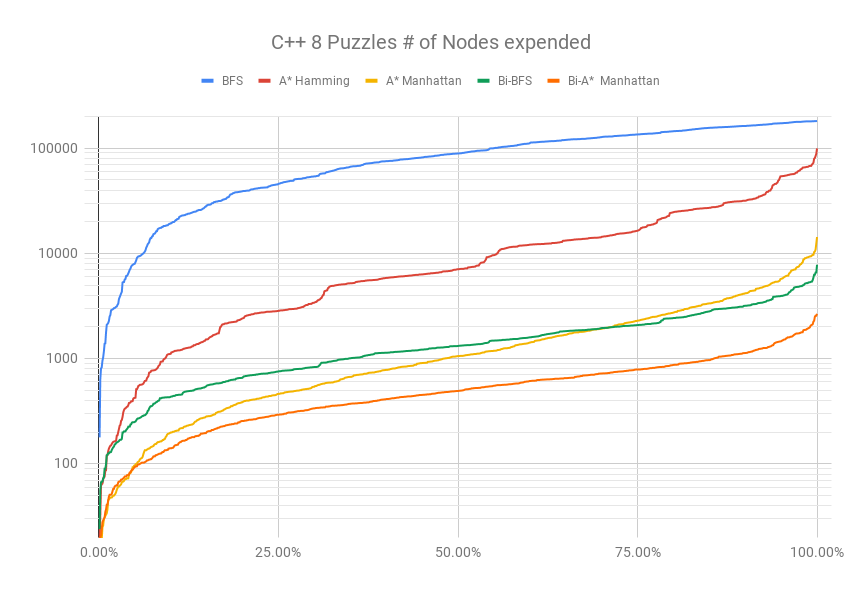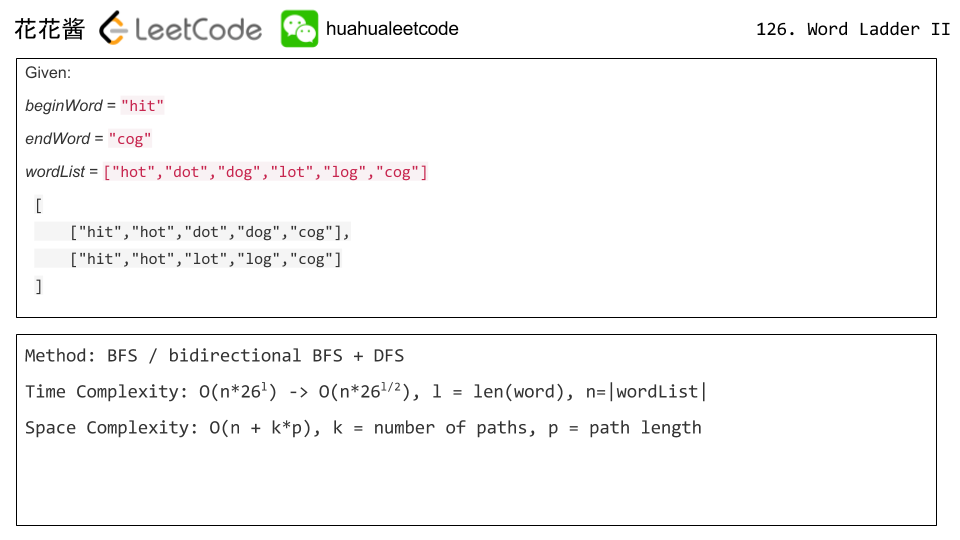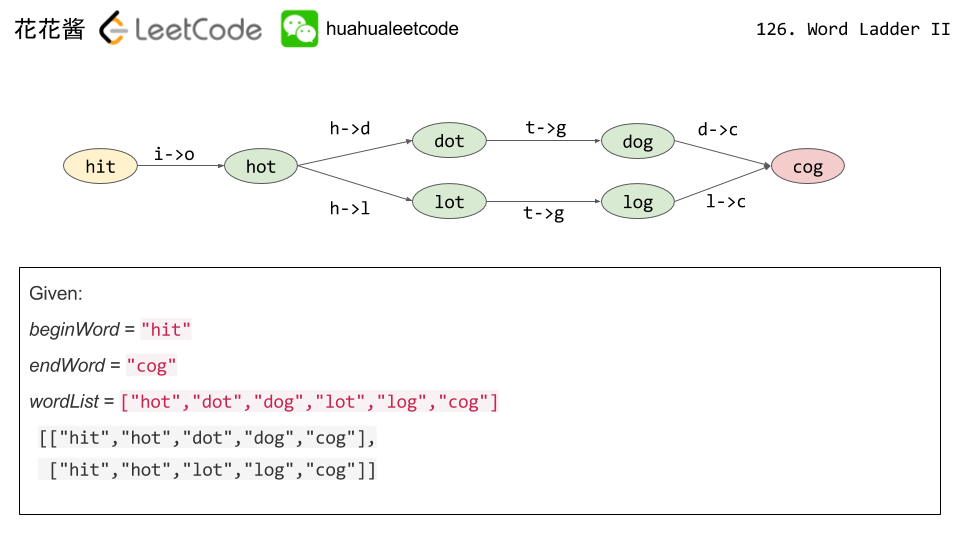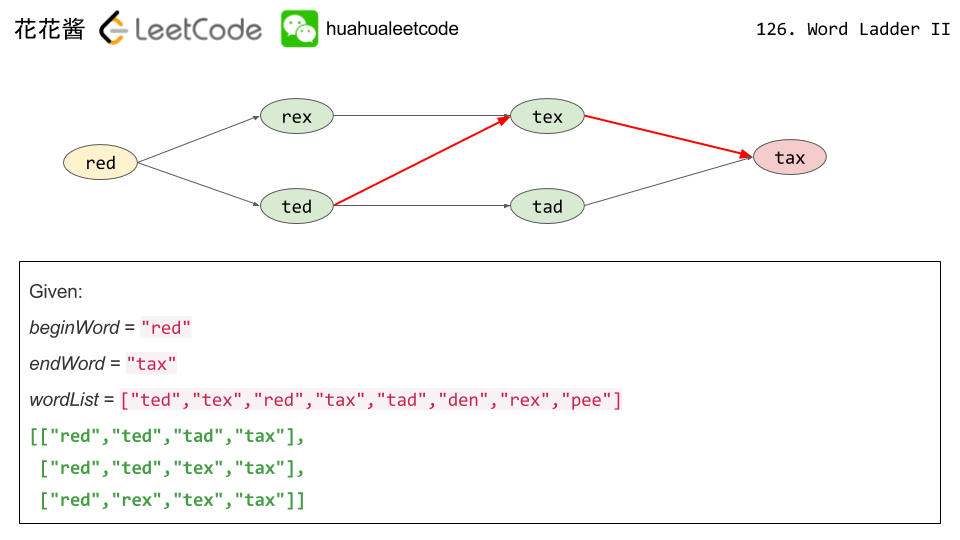
8 Puzzles # nodes expended of 1000 solvable instances

Conclusion:
Nodes expended: BiDirectional A* << A* (Manhattan) <= Bidirectional BFS < A* Hamming << BFS
Running time: BiDirectional A* < Bidirectional BFS <= A* (Manhattan) < A* Hamming << BFS
Code:
|
1 2 3 4 5 6 7 8 9 10 11 12 13 14 15 16 17 18 19 20 21 22 23 24 25 26 27 28 29 30 31 32 33 34 35 36 37 38 39 40 41 42 43 44 45 46 47 48 49 50 51 52 53 54 55 56 57 58 59 60 61 62 63 64 65 66 67 68 69 70 71 72 73 74 75 76 77 78 79 80 81 82 83 84 85 86 87 88 89 90 91 92 93 94 95 96 97 98 99 100 101 102 103 104 105 106 107 108 109 110 111 112 113 114 115 116 117 118 119 120 121 122 123 124 125 126 127 128 129 130 131 132 133 134 135 136 137 138 139 140 141 142 143 144 145 146 147 148 149 150 151 152 153 154 155 156 157 158 159 160 161 162 163 164 165 166 167 168 169 170 |
# Author: Huahua from collections import deque import heapq import numpy as np import random import sys N = 3 def Manhattan(s1, s2): dist = 0 for i1, d in enumerate(s1): i2 = s2.index(d) x1 = i1 % N y1 = i1 // N x2 = i2 % N y2 = i2 // N dist += abs(x1 - x2) + abs(y1 - y2) return dist def Hamming(s1, s2): return sum(x != y for x, y in zip(s1, s2)) class Node: dirs = [0, -1, 0, 1, 0] def __init__(self, state, parent = None, h = 0): self.state = state self.parent = parent self.g = parent.g + 1 if parent else 0 self.h = h self.f = self.g + self.h def getMoves(self): moves = [] index = self.state.index(0) x = index % N y = index // N for i in range(4): tx = x + Node.dirs[i] ty = y + Node.dirs[i + 1] if tx < 0 or ty < 0 or tx == N or ty == N: continue i = ty * N + tx move = list(self.state) move[index] = move[i] move[i] = 0 moves.append(tuple(move)) return moves def print(self): print(np.reshape(self.state, (N, N))) def __lt__(self, other): return self.f < other.f def AStarSearch(start_state, end_state, heuristic): def h(s): return heuristic(s, end_state) q = [] s = Node(start_state, h=h(start_state)) heapq.heappush(q, s) opened = {s.state : s.f} closed = dict() while q: n = heapq.heappop(q) if n.state == end_state: return n, len(opened), len(closed) if n.state in closed: continue closed[n.state] = n.f for move in n.getMoves(): node = Node(move, n, h(move)) if move in opened and opened[move] <= node.f: continue opened[node.state] = node.f heapq.heappush(q, node) return None, len(opened), len(closed) def BFS(start_state, end_state): q = deque() q.append(Node(start_state)) opened = set(start_state) closed = 0 while q: n = q.popleft() if n.state == end_state: return n, len(opened), closed closed += 1 for move in n.getMoves(): if move in opened: continue opened.add(move) q.append(Node(move, n)) return None, len(opened), closed def getRootNode(n): return getRootNode(n.parent) if n.parent else n def BidirectionalBFS(start_state, end_state): def constructPath(p, o): while o: t = o.parent o.parent = p p, o = o, t return p ns = Node(start_state) ne = Node(end_state) q = [deque([ns]), deque([ne])] opened = [{start_state : ns}, {end_state: ne}] closed = [0, 0] while q[0]: l = len(q[0]) while l > 0: p = q[0].popleft() closed[0] += 1 for move in p.getMoves(): n = Node(move, p) if move in opened[1]: o = opened[1][move] if getRootNode(n).state == end_state: o, n = n, o n = constructPath(n, o.parent) return n, len(opened[0]) + len(opened[1]), closed[0] + closed[1] if move in opened[0]: continue opened[0][move] = n q[0].append(n) l -= 1 q.reverse() opened.reverse() closed.reverse() return None, len(opened[0]) + len(opened[1]), closed[0] + closed[1] def print_path(n): if not n: return print_path(n.parent) n.print() def solvable(state): inv = 0 for i in range(N*N): for j in range(i + 1, N*N): if all((state[i] > 0, state[j] > 0, state[i] > state[j])): inv += 1 return inv % 2 == 0 if __name__ == '__main__': s = [1, 2, 3, 4, 5, 6, 7, 8, 0] e = [1, 2, 3, 4, 5, 6, 7, 8, 0] i = 0 while True: random.shuffle(s) if not solvable(s): continue n1, opened1, closed1 = AStarSearch(tuple(s), tuple(e), heuristic=Manhattan) n2, opened2, closed2 = AStarSearch(tuple(s), tuple(e), heuristic=Hamming) n3, opened3, closed3 = BFS(tuple(s), tuple(e)) n4, opened4, closed4 = BidirectionalBFS(tuple(s), tuple(e)) print("%d\t%d\t%d\t%d" % (closed1, closed2, closed3, closed4)) sys.stdout.flush() # print("A*") # print_path(n1) # print('---------------') # print("BFS") # print_path(n3) # print('---------------') # print("Bi-BFS") # print_path(n4) # print('---------------') i += 1 if i == 1000: break |
C++ Version
|
1 2 3 4 5 6 7 8 9 10 11 12 13 14 15 16 17 18 19 20 21 22 23 24 25 26 27 28 29 30 31 32 33 34 35 36 37 38 39 40 41 42 43 44 45 46 47 48 49 50 51 52 53 54 55 56 57 58 59 60 61 62 63 64 65 66 67 68 69 70 71 72 73 74 75 76 77 78 79 80 81 82 83 84 85 86 87 88 89 90 91 92 93 94 95 96 97 98 99 100 101 102 103 104 105 106 107 108 109 110 111 112 113 114 115 116 117 118 119 120 121 122 123 124 125 126 127 128 129 130 131 132 133 134 135 136 137 138 139 140 141 142 143 144 145 146 147 148 149 150 151 152 153 154 155 156 157 158 159 160 161 162 163 164 165 166 167 168 169 170 171 172 173 174 175 176 177 178 179 180 181 182 183 184 185 186 187 188 189 190 191 192 193 194 195 196 197 198 199 200 201 202 203 204 205 206 207 208 209 210 211 212 213 214 215 216 217 218 219 220 221 222 223 224 225 226 227 228 229 230 231 232 233 234 235 236 237 238 239 240 241 242 243 244 245 246 247 248 249 250 251 252 253 254 255 256 257 258 259 260 261 262 263 264 265 266 267 268 269 270 271 272 273 274 275 276 277 278 279 280 281 282 283 284 285 286 287 288 289 290 291 292 293 294 295 296 297 298 299 300 301 302 303 304 305 306 307 308 309 310 311 312 313 314 315 316 317 318 319 320 321 322 323 324 325 |
#include <algorithm> #include <array> #include <chrono> #include <deque> #include <functional> #include <iostream> #include <memory> #include <queue> #include <unordered_map> #include <unordered_set> #include <vector> using namespace std; using chrono::high_resolution_clock; constexpr int N = 3; constexpr int dirs[] = {0, 1, 0, -1, 0}; struct Node; typedef string State; typedef shared_ptr<Node> NodePtr; typedef function<int(const State& s, const State& t)> Heuristic; struct Node { Node(State s, NodePtr p = nullptr, int h = 0) : s(s), p(p), h(h), g(p ? p->g + 1 : 0), f(this->h + g) {} vector<State> GetNextStates() const { vector<State> states; int index = find(s.begin(), s.end(), '0') - s.begin(); int x = index % N; int y = index / N; for (int i = 0; i < 4; ++i) { int tx = x + dirs[i]; int ty = y + dirs[i + 1]; if (tx < 0 || ty < 0 || tx == N || ty == N) continue; int new_index = ty * N + tx; State next(s); next[index] = s[new_index]; next[new_index] = '0'; states.push_back(move(next)); } return states; } NodePtr p; int h; int g; int f; State s; }; bool Sovlable(const State& s) { int inv_count = 0; for (int i = 0; i < N * N; ++i) { for (int j = i + 1; j < N * N; ++j) { if (s[i] != '0' && s[j] != '0' && s[i] > s[j]) { ++inv_count; } } } return inv_count % 2 == 0; } NodePtr GetRoot(NodePtr n) { return n->p ? GetRoot(n->p) : n; } NodePtr WirePath(NodePtr p, NodePtr n) { while (n) { NodePtr t = n->p; n->p = p; p = n; n = t; } return p; } void ConstructPath(NodePtr node, vector<State>* path) { while (node) { path->push_back(node->s); node = node->p; } reverse(path->begin(), path->end()); } class Solver { public: virtual bool Solve(State start, State target, vector<State>* path, int* opened, int* closed) = 0; }; class BFSSolver : public Solver { public: bool Solve(State start, State target, vector<State>* path, int* opened, int* closed) override { int expended = 0; unordered_set<string> seen; deque<NodePtr> q{make_shared<Node>(start)}; while (!q.empty()) { auto cur = q.front(); q.pop_front(); ++expended; if (cur->s == target) { ConstructPath(cur, path); *opened = seen.size(); *closed = expended; return true; } for (const auto& s : cur->GetNextStates()) { auto r = seen.insert(s); if (!r.second) continue; q.push_back(make_shared<Node>(s, cur)); } } return false; } }; class BidirectionalBFSSolver : public Solver { public: bool Solve(State start, State target, vector<State>* path, int* opened, int* closed) override { auto start_node = make_shared<Node>(start); auto target_node = make_shared<Node>(target); unordered_map<string, NodePtr> seen0{{start, start_node}}; unordered_map<string, NodePtr> seen1{{target, target_node}}; deque<NodePtr> q0{start_node}; deque<NodePtr> q1{target_node}; int expended = 0; while (!q0.empty()) { size_t size = q0.size(); while (size--) { auto cur = q0.front(); q0.pop_front(); ++expended; for (const auto& s : cur->GetNextStates()) { auto n = make_shared<Node>(s, cur); auto it = seen1.find(s); if (it != seen1.end()) { auto p = it->second; if (GetRoot(n)->s == target) swap(n, p); n = WirePath(n, p->p); ConstructPath(n, path); *opened = seen0.size() + seen1.size(); *closed = expended; return true; } if (seen0.count(s)) continue; seen0[s] = n; q0.push_back(n); } } if (q1.size() < q0.size()) { swap(q0, q1); swap(seen0, seen1); } } return false; } private: }; struct NodeCompare : public binary_function<NodePtr, NodePtr, bool> { bool operator()(const NodePtr& x, const NodePtr& y) const { return x->f > y->f; } }; int ManhattanDistance(const State& s, const State& t) { int h = 0; for (int i1 = 0; i1 < N * N; ++i1) { int i2 = t.find(s[i1]); int x1 = i1 % N; int y1 = i1 / N; int x2 = i2 % N; int y2 = i2 / N; h += abs(x1 - x2) + abs(y1 - y2); } return h; } int HammingDistance(const State& s, const State& t) { int h = 0; for (size_t i = 0; i < s.size(); ++i) { if (s[i] != t[i]) ++h; } return h; } class AStarSolver : public Solver { public: explicit AStarSolver(Heuristic heuristic) : heuristic_(heuristic) {} bool Solve(State start, State target, vector<State>* path, int* opened, int* closed) override { unordered_map<string, NodePtr> o; unordered_set<string> c; priority_queue<NodePtr, vector<NodePtr>, NodeCompare> q; q.emplace(new Node(start, nullptr, heuristic_(start, target))); while (!q.empty()) { auto cur = q.top(); q.pop(); if (cur->s == target) { ConstructPath(cur, path); *opened = o.size(); *closed = c.size(); return true; } if (!c.insert(cur->s).second) continue; for (const auto& s : cur->GetNextStates()) { auto it = o.find(s); auto n = make_shared<Node>(s, cur, heuristic_(s, target)); if (it != o.end() && n->f >= it->second->f) continue; o[s] = n; q.push(n); } } return false; } private: Heuristic heuristic_; }; class BiAStarSolver : public Solver { public: explicit BiAStarSolver(Heuristic heuristic) : heuristic_(heuristic) {} bool Solve(State start, State target, vector<State>* path, int* opened, int* closed) override { unordered_map<string, NodePtr> o0, o1; unordered_map<string, NodePtr> c0, c1; priority_queue<NodePtr, vector<NodePtr>, NodeCompare> q0, q1; q0.emplace(new Node(start, nullptr, heuristic_(start, target))); q1.emplace(new Node(target, nullptr, heuristic_(target, start))); bool farward = true; while (!q0.empty()) { auto size = q0.size(); while (size--) { auto cur = q0.top(); q0.pop(); if (c0.count(cur->s)) continue; c0[cur->s] = cur; if (c1.count(cur->s)) { auto p = c1[cur->s]; if (GetRoot(cur)->s == target) swap(cur, p); cur = WirePath(cur, p->p); ConstructPath(cur, path); *opened = o0.size() + o1.size(); *closed = c0.size() + c1.size(); return true; } for (const auto& s : cur->GetNextStates()) { auto it = o0.find(s); auto n = make_shared<Node>(s, cur, heuristic_(s, farward ? target : start)); if (it != o0.end() && n->f >= it->second->f) continue; o0[s] = n; q0.push(n); } } if (q1.size() < q0.size()) { swap(q0, q1); swap(c0, c1); swap(o0, o1); farward = !farward; } } return false; } private: Heuristic heuristic_; }; bool VerifyPath(const vector<State>& path, const State& s, const State& t) { if (path.empty()) return false; if (path.front() != s || path.back() != t) return false; for (size_t i = 1; i < path.size(); ++i) { Node n(path[i - 1]); auto states = n.GetNextStates(); if (find(begin(states), end(states), path[i]) == end(states)) { return false; } } return true; } void StatisticsMode() { State s{"123456780"}; State t{"123456780"}; vector<unique_ptr<Solver>> solvers; solvers.emplace_back(new BFSSolver); solvers.emplace_back(new AStarSolver(HammingDistance)); solvers.emplace_back(new AStarSolver(ManhattanDistance)); solvers.emplace_back(new BidirectionalBFSSolver); solvers.emplace_back(new BiAStarSolver(ManhattanDistance)); for (int i = 0; i < 1000;) { random_shuffle(s.begin(), s.end()); if (!Sovlable(s)) continue; ++i; for (auto& solver : solvers) { vector<State> path; int opened; int closed; auto t0 = high_resolution_clock::now(); bool sovlable = solver->Solve(s, t, &path, &opened, &closed); auto t1 = high_resolution_clock::now(); if (!VerifyPath(path, s, t)) { cerr << "Invalid path!" << endl; return; } auto time_span = chrono::duration_cast<chrono::duration<double>>(t1 - t0); cout << closed << "\t" << time_span.count() * 1000 << "\t"; } cout << endl; } } int main() { StatisticsMode(); } |


